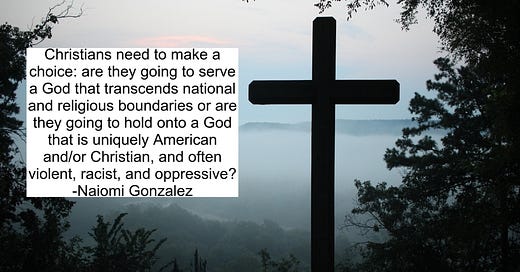Lent Post 4: The Dangers of American and Christian Exceptionalism
American exceptionalism is the idea that the United States and its political systems and values are not only unique but should be universally applied. Adherents of American exceptionalism often depict the United States as a shining beacon in the world, mostly seeking to do the right thing.
Christian exceptionalism is the notion that Christianity is unique and is the only “true” path to God. Those who believe in Christian exceptionalism often portray Christianity as superior to other religions. In the United States, Christian exceptionalism is often, but not always tied to the idea that Christianity is especially “democratic” and concerned with human rights. Other religious traditions are at worst, oppressive, or at best, just not quite as dedicated to liberation as Christianity.
In the United States, American and Christian exceptionalism often go hand in hand. But not always. It is possible to adhere to Christian exceptionalism and reject the idea that the United States is superior or at least unique in comparison to other countries. The reverse is also true. One can assert that the United States is the greatest country in the world without believing that Christianity is the only path to God or is better than other religions.
While some of the more extreme forms of American and Christian exceptionalism can be tied to those on the more conservative end of the political and theological spectrum, those on the more centrist/liberal/progressive side, can also adhere to less explicit notions of American and/or Christian exceptionalism.
In its more extreme forms, American and Christian exceptionalism can morph into Christian nationalism, but as mentioned earlier, American and Christian exceptionalism do not necessarily need to go together. Nor do they, individually or combined, necessarily lead to the extremism that is often behind Christian nationalism. But both Christian and American exceptionalism provide the ideologically and theological frameworks that undergird Christian nationalism. Additionally, even in their more “moderate” forms, these two forms of exceptionalism can be toxic and dangerous. First, let me tackle American exceptionalism.
It is one thing for someone to feel “proud” of being an American and to emphasize the positive aspects of the United States. But American exceptionalism often goes beyond simple pride, and veers into the arrogant and self-serving. One can appreciate the democratic norms and freedoms available in the United States but it is intellectually dishonest to claim that the United States is the best example of democratic norms and no other nation comes close.
American exceptionalism often examines the history of the United States with blinders on. Emphasizing the good while downplaying the bad. Even when supporters of American exceptionalism acknowledge horrific events in American history, they somehow manage to twist it into a good. For example, “yeah chattel slavery was horrific, but the United States eventually figured out it was wrong and stopped doing it.” Or, “yes, Jim Crow was horrible, but Civil Rights Leaders, tapped into the ideals of our nation and reminded us, as a country, about our nation’s commitment to justice and equality.”
Believers of American exceptionalism also downplay the current inequalities in the US often by claiming, “yeah the US isn’t perfect, but it’s better than other countries,” as if such comparisons provide comfort to those currently on the receiving end of American racism, bigotry and state violence.
American exceptionalism also undergirds some of our more disastrous foreign policy decisions. Or at the very least, the language used to justify said policies, often reference American exceptionalism. The War on Terror was not only framed as revenge for the 9/11 attacks, but as a commitment on the part of the United States and its allies to bringing “freedom” and “democracy” to the world. The War on Terror, especially as the US began to fight in countries that had no direct involvement with 9/11, was presented as a benevolent action, freeing oppressed people from evil groups/governments.
To be sure, some of these countries, were in fact ruled by violent and oppressive groups and/or governments, but followers of American exceptionalism often downplay how our prior relationships to said groups/governments were complicated and we didn’t always view them as unmitigated evils to be destroyed. In fact, at different times we may have actively supported politically, financially, or militarily a version of these groups and/or governments.
Christian exceptionalism also provides a distorted lens when examining both Christianity and other religions. Even the kinder forms of Christian exceptionalism which state, “yeah, other religions have some truth to them, but Christianity offers the most complete version of Truth” are problematic because these “softer” forms of Christian exceptionalism still rely on putting other religious beliefs down, in order to elevate Christianity.
I am not saying that Christians cannot or should not critique other religious beliefs that may be harmful or oppressive. And other forms of religious exceptionalism exists and they too, are harmful and need to be critiqued and dismantled. But for Christians to pretend that our faith is somehow more ethical requires ignoring or downplaying the vast history of Christians justifying their violent and oppressive actions via their faith.
Christian exceptionalism also often relies on caricatures of other faith traditions in order to justify Christian superiority. For example, it relies on anti-Semitic tropes that cast Judaism as a “legalistic” religion and downplays the influential and vital role of Judaism in the origins of Christians. (Fact: Jesus was not a Christian). Islam, is portrayed as uniquely anti-democratic and oppressive. And non-Abrahamic religions are either ignored or denigrated as “weird” and “strange.”
Christians who adhere to Christian and/or American exceptionalism are creating golden calves of the state and/or their religious tradition. American and Christian exceptionalism are violent, oppressive, and antithetical to the gospel. Christians need to make a choice: are they going to serve a God that transcends national and religious boundaries or are they going to hold onto a God that is uniquely American and/or Christian, and often violent, racist, and oppressive?



